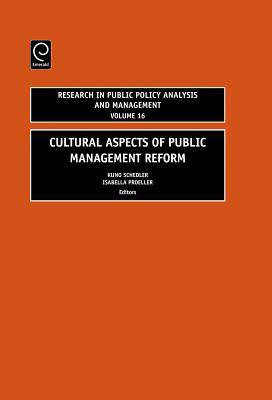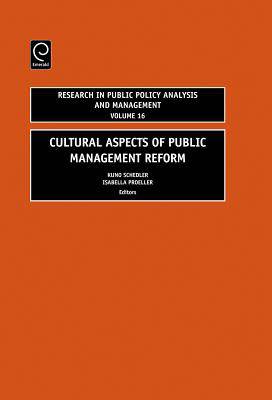
- Afhalen na 1 uur in een winkel met voorraad
- Gratis thuislevering in België vanaf € 30
- Ruim aanbod met 7 miljoen producten
- Afhalen na 1 uur in een winkel met voorraad
- Gratis thuislevering in België vanaf € 30
- Ruim aanbod met 7 miljoen producten
Zoeken
Cultural Aspects of Public Management Reform
€ 249,95
+ 499 punten
Omschrijving
In an international context, public management arrangements differ significantly from country to country, but also regionally and locally. One reason for these differences may be differences in culture resulting in differing views of the state and its institutions. This may sound trivial, but it becomes highly important when public management reform models are proposed and transferred from one country to others, such as was (and still is) the case with, for example, the new public management. Scholars in public management as well as internationally acting practitioners should be aware of the impact culture has on the possibilities and limits of concept transfers between different jurisdictions.Having said this, one precondition for a better consideration of cultural elements in public management reforms is a better understanding of culture itself. Among the public management community, cultural theory has gained considerable attention. There are, however, other concepts for the analysis of cultural facts that may be of interest to the subject, too. In this book, cultural influences (including organizational culture of public organizations) on public management and its reform are explored. The articles address definitions and conceptualizations of culture in the context of public management, cultural artifacts in public management, and give examples of cultural elements in public management from various countries. This volume helps to structure the discussion of cultural elements and points out approaches to study and incorporate cultural aspects in public management research and debate.
Specificaties
Betrokkenen
- Uitgeverij:
Inhoud
- Aantal bladzijden:
- 380
- Taal:
- Engels
- Reeks:
- Reeksnummer:
- nr. 16
Eigenschappen
- Productcode (EAN):
- 9780762314003
- Verschijningsdatum:
- 31/08/2007
- Uitvoering:
- Hardcover
- Formaat:
- Genaaid
- Afmetingen:
- 155 mm x 235 mm
- Gewicht:
- 666 g

Alleen bij Standaard Boekhandel
+ 499 punten op je klantenkaart van Standaard Boekhandel
Beoordelingen
We publiceren alleen reviews die voldoen aan de voorwaarden voor reviews. Bekijk onze voorwaarden voor reviews.










